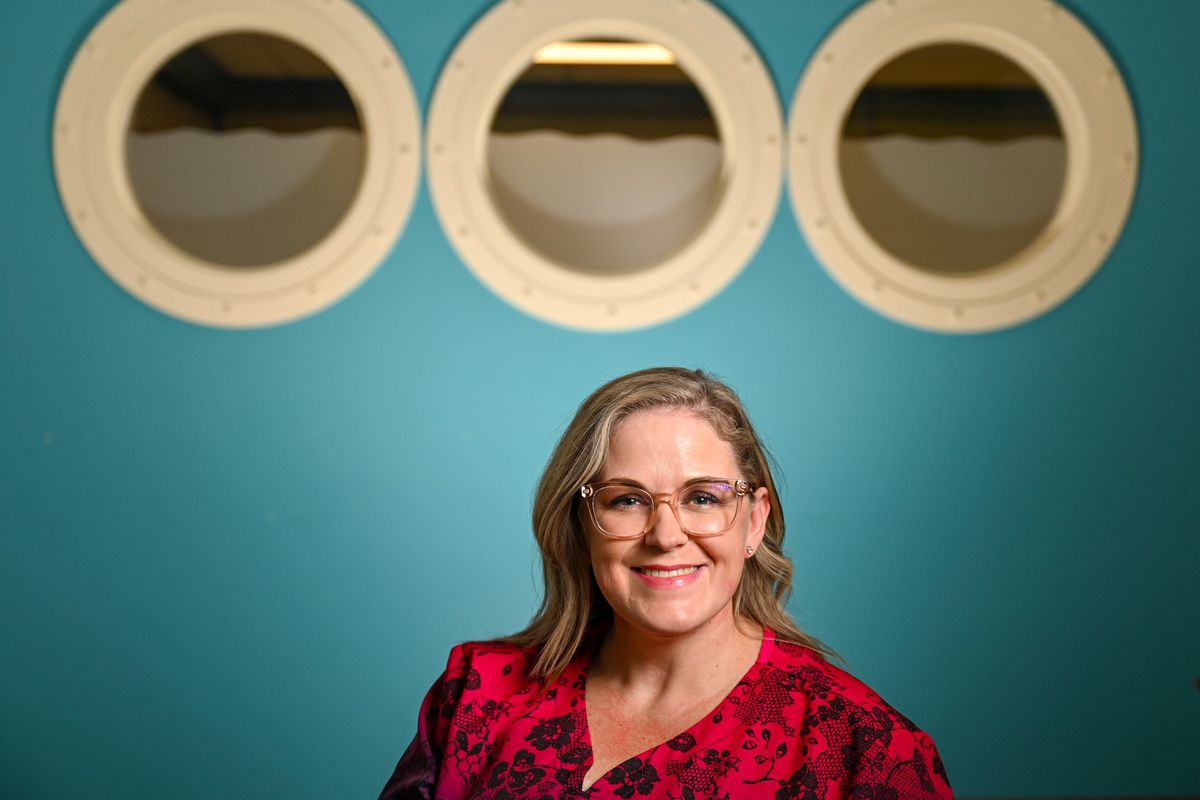From NICU baby to longtime pediatric nurse, Sacred Heart’s Ami Atkins comes full circle

Ami Atkins hasn’t ventured far from pediatric intensive care spaces at Providence Sacred Heart Children’s Hospital.
Atkins spent two days in Sacred Heart’s neonatal intensive care unit in December 1979 because of swelling on her head. It was precautionary, because at 9 pounds, 4 ounces, she was otherwise healthy.
“The funny story my mom told the family was that I was born with two heads, because my head had a hematoma, a big swollen spot,” Atkins said. “My mom only got to see my face for the first 24 hours, because they wrapped me up.
“My grandma was a nurse here as well, so she got to see me and started a prayer chain through her church. By the next morning, the lump was gone.”
By age 21, Atkins walked into that same unit as an NICU nurse, after finishing her Spokane Community College associate degree as a teen mom. In those early days, Atkins told a few of her new coworkers that they likely cared for her as a baby.
Caring for hundreds of newborns passing through, most nurses told her they didn’t remember her specifically but likely held her. It was a fun connection, Atkins said.
One of those conversations was with Dr. Hrair Garabedian, Atkins’ first physician in the NICU and a pediatric cardiologist who helped to form the children’s hospital 20 years ago.
“I remember talking to Hrair one time and saying, ‘I was a baby in the NICU and you were my doctor,’ ” Atkins said. “He said, ‘Well, you must only be 10 years old then; there is no way you could be old enough to work here.’ ”
For six months after her SCC graduation, Atkins cared for adult patients at the hospital. Her goal was children’s hospital care, so she got the NICU job by January 2001, spending a decade there – half the time as a nurse and then as assistant nurse manager on night shift.
Atkins then moved to the nearby Pediatric ICU, where she remains today.
Atkins had always wanted to be a nurse because her grandmother, Carol Sullivan-Davis, was a Sacred Heart surgical nurse. She still calls her “grandma nurse” today, although Sullivan-Davis is retired and living in California.
At Mead High School, Atkins enrolled in Running Start to get her health care studies started at SCC. Some of those plans shifted a bit during her senior year.
“I got pregnant at 17 and had my oldest daughter, Aubree, who is now 26,” Atkins said. “My daughter now is in nursing school and doing her prerequisites. She’s going to SCC, the same school as me. Then I went back and got my bachelor’s after a few years.”
Early in her career, Atkins juggled care for her infant daughter around school, while Aubree’s father, Cody Glotfelty, helped, along with both of their families.
He worked all day so she could stay home with the baby, and then at night, he took over care so Atkins could go to school.
A few years later, tragedy struck. Glotfelty was shot and killed in a marijuana deal that went awry on Spokane’s lower South Hill.
“My daughter’s dad was murdered when she was 4 years old; we had been separated for six months before he died,” Atkins said. “That was a rough go. He was very involved in her life, and his family is still involved.”
Atkins kept steady in her career, working in the NICU until 2010.
When she moved to the pediatric unit, she worked with young patients at bedside for several years and then moved to her current role of assistant nurse manager, which she’s had for six years. The PICU cares for patients ranging from newborns discharged after heart surgeries to teenagers who need hospital care.
“The PICU is a whole different world and for a range of health issues,” she said.
They do specialized treatments like extracorporeal membrane oxygenation, a type of life support that oxygenates the blood.
“We care for the sickest of the sick,” she said.
Atkins eventually married Andre Atkins, and they have two children, a 20-year-old son and 13-year-old daughter.
Her work in pediatric care is still rewarding, she said, now in a role to support caregivers, as well as patients’ families. Atkins said she hopes to inspire more people to enter nursing, with staffing shortages an ongoing concern.
“It’s unprecedented what we’re going through now – being in management 10 years ago in NICU and what we had for open positions and hiring then, compared with now,” she said.
It isn’t unusual lately to see six to eight openings on one shift, she said.
Atkins has longtime friends among NICU nurses, and sometimes, she still tells people about her unusual tie.
“I’ve been in the same hospital for 22 years, and that’s not how it always goes,” she said.
She’s come to cherish the relationships with former patients like herself.
“There are days I walk out and I’m in shock that a patient is still here. We do some amazing saves. Later, some of them come back to visit. It’s amazing to see them walking and talking,” she said. “To some, I say, ‘I didn’t think you were going to survive.’ Families build these lifelong relationships with you. They remember you were the one who was there that day.”